10th July 2025
Simikot, Humla, Nepal
Dear A,
I’m writing to you from Simikot, the capital of Humla, Nepal. We are 2910 metres above sea level, 428 kilometres from Kathmandu and about 50 kilometres from the Tibet/Chinese border. I arrived yesterday on a fifteen-seater plane with Indian pilgrims headed for Mount Kailash and local men and women carrying bags of mangoes and medical reports. (There’s only basic healthcare in Humla, so for any kind of specialist treatment people must fly, at their own expense, to Nepalgunj, and, depending on the illness, from there to Kathmandu. Among the people carrying medical reports was an old lady wrapped up in multiple woollen shawls and a middle-aged man with a growth the size of a tangerine bulging from his neck.)
Yesterday evening I overcame my shyness and went to say goodbye to SR, my teacher’s brother and right-hand man. It’s difficult to express how deeply I admire him—his powerful compassion, his acute sensitivity, his utter lack of artifice. This morning, as I sat in bed, still blurry-eyed, I felt like his compassion was pushing my chest open and for a few minutes I wept.
In the airport at Kathmandu, I bought myself a cup of milk tea and sat down at a wooden table scattered with sugar and crumpled paper napkins. A Sikh gentleman asked if he could join me and we began to talk about pilgrimage and contentment. His eyes seemed slightly malignant, even though his talk was very sweet. When he introduced himself and offered me his hand, it was alarmingly hot. For a moment, I was afraid. Then he placed his hands back around his paper cup of coffee and I realised that was where the heat had come from. When I told him I was going to the mountains to see my teacher, a look of distaste crossed his face. He began describing spiritual teachers ‘opening up shop’, each one taking a different slant ‘in order to confuse the people’. The only way to travel the spiritual path, he said, is by relying on oneself. ‘Exactly,’ I said, nodding in agreement, which only made him frown.
It wasn’t that easy to communicate. Our accents were unfamiliar to each other, and we kept having to ask the other to repeat what they said. If the flow of communication had been smoother, I might have said that I agree with his point about self-reliance. As Buddha himself said, ‘You are your own protector, you are your own enemy.’ The problem is that, despite all our efforts, we don’t know how to be our own protectors, and too often we end up being our own worst enemy. That’s why we need to rely on a teacher and let ourselves be guided, for a period at least.
Anyway, I stood up shortly after this and moved over to the gate. I didn’t see him again until I was settled in my seat on the plane to Nepalgunj. It turns out he was on the same flight, sitting in the seat next to me. ‘We meet again,’ he said, and I smiled widely, to reassure myself more than him that I was not holding his words against him.
While the plane was filling up, I took my phone out and put my earphones in. As I listened to ‘Skinny Love’, first by Bon Iver, then by Birdy, I thought again of SR, his steady presence which I can only describe as pure love. Then I found myself in the kitchen of our house in London. I must be around fourteen years old. The phone on the counter rings and I pick it up. It’s A, my mother’s best friend. I tell her that mum is out, that I’ll tell her A called when she gets back. Then, as I’m putting the phone down, I say, I love you. (A strange habit me and several school friends have gotten into, often with embarrassing consequences.) I can hear A’s discomfort. Even though she’s known me since I was a little kid and is a sort of aunt- or godmother-figure in my life, she doesn’t say it back, not that I was expecting her to, but— I quickly hang up. It was just a slip of the tongue, I tell myself, something to laugh about with my friends. Still, that awkward silence is like a jolt on a train track. A jarring realization that there is a limit to A’s love for me, and by extension a limit to the love of the other people in my life.
It was interesting—indicative—that this memory came up. I know you know what I mean. I sort of want to say more about this here, but my thoughts feel a little scrambled, or too faint, too weak.
In Nepalgunj, I stepped off the plane and almost straight on to my connecting flight—the fifteen-seater that would fly 217 kilometres to Simikot and, in thirty minutes, rise 2760 metres in elevation. I always find this flight physically unnerving. First you’re penetrated by an intense heat, then a wispy weightless feeling as if the pieces of one’s body are falling apart.
Fifteen minutes into the flight, the plane began lurching up and down. The stewardess said something in Nepalese that I only half understood. As I held on to the seat in front of me, I remembered my teacher telling us how one of his teachers taught him to broaden the scope of the rather small-minded prayers people often request—such as prayers to ensure they have a safe flight: You should pray for them just as requested, but expand the scope to include everyone who’s flying, who’s anxious and afraid, everyone who’s travelling, whether in this world or from this world to the next. Then you’re transforming a mundane mindset into bodhicitta, and still honouring their request. I thought of Shantideva’s prayer in the tenth chapter of his Entering the Way of the Bodhisattva and I felt—felt in the sense of knowing—that if we really call upon these great beings they will really come to us.
…. May travellers upon the road
Find happiness no matter where they go,
And may they gain, without the need of toil,
The goals on which they set their hearts.
May those who put to sea in boat or ship,
Attain the ports that they desire,
And may they safely come to shore
And sweet reunion with their kith and kin.
May those who lose their way and wander
In the wild find fellow travellers.
And safe from threat of thieves and savage beasts,
May they be tireless and their journey light….1
R met me at the airport, unasked, and helped me carry my bags through the town to his family hotel. Everything here is community. People automatically help one another on a daily basis, without expecting anything in return. As R and his wife cooked me lunch (chowmein with home-grown beans, local peas and capsicum), I sat in the sun, looking out at the airstrip and watching white wisps of cloud drift in. That afternoon it began to rain, the first proper summer rain I was told. The rain continued all through the night, tapping gently on the corrugated iron roof.
This morning, as I was walking down the street, I heard a trickling sound behind me. I turned around to see a young boy around four years old peeing off the wooden balcony of his house. The arch of his pee was splashing noisily on the white sacks covering an enormous pile of wood.
All over the town are bright bursts of peach dahlias and scarlet dahlias, dahlias in lucid yellow and baby pink. The sunflowers and cosmos are just coming into bloom, and bordering vegetable beds of Chinese spinach, chard, broccoli, and beans are velveteen marigolds. There are hollyhocks at least seven feet tall, bright purple and blood red. All my favourite flowers—the flowers of my mother’s gardens from my English childhood—grow here in effortless abundance, and this makes me wonder about their origin. Were they discovered in the Himalayas and introduced to the UK? (It seems unlikely that it would have been the other way around.) I took my camera out and took close-us of the flowers, still glistening with drops of rain. Then I took out my phone, took half a dozen photos, and sent them to you and J.
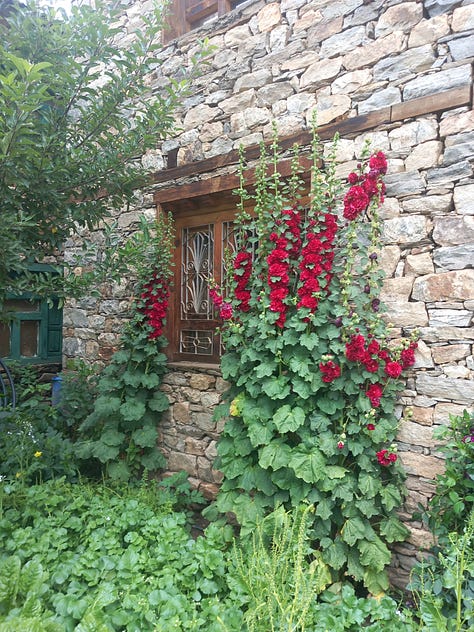
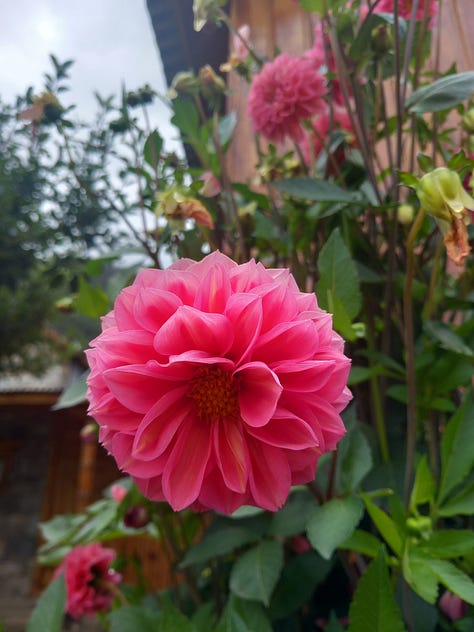
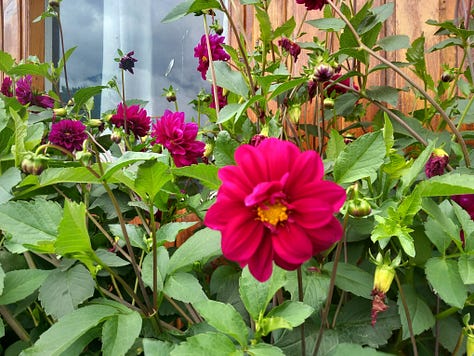
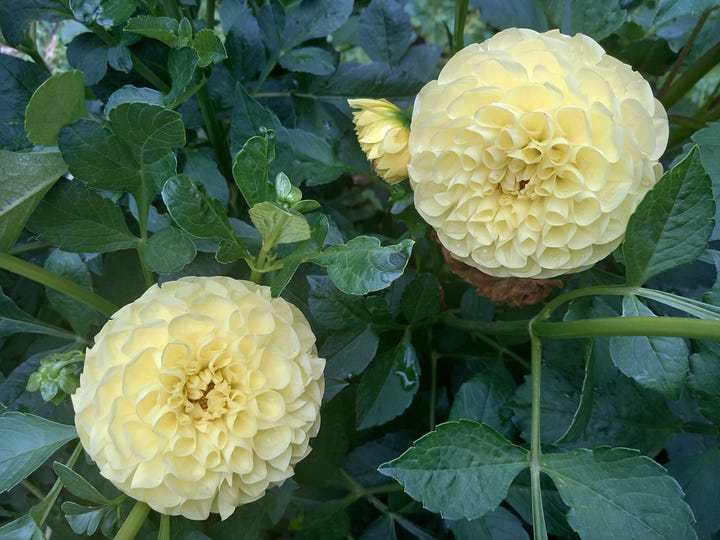
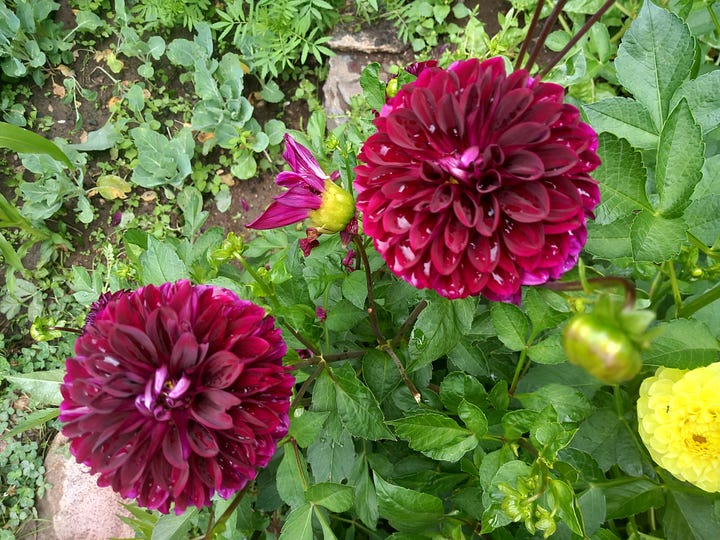
When I went to the pharmacy to buy a few more packs of allergy pills in preparation for being eaten alive by fleas and bed bugs in the monastery, the pharmacist handed me a tube of hydrocholoride cream, which I already have plenty of. When I asked him for something in pill form, he handed me a pack of contraceptive pills. I studied the packet carefully, reading the text on the front, then the back. ‘This isn’t what I need, actually. I was looking for allergy pills,’ I said, and he handed me another pack of contraceptive pills, a stronger version that required just one pill per month. I imagine it was just miscommunication—my own fault since, as you know, I barely speak Nepali despite having lived here for many years. But as I was walking to the café to get a coffee, I wondered if this was a local code, if pregnancy is described by some women here as an allergy? (And I wonder if this thought will make you laugh or frown.) It was also a shard of light illuminating how people see me—as a woman, of child-bearing age, and not a childless nun.
Allergy (from the Merriam Webster dictionary)
1. altered bodily reactivity (such as hypersensitivity) to an antigen in response to first exposure
2. exaggerated or pathological immunological reaction to substances, situations, or physical states that are without comparable effect on an average individual
3. medical practice concerned with allergies
4. a feeling of antipathy or aversion
This afternoon I will drive (or rather, be driven) to the monastery, changing cars twice because of some issues with the road. It has all been arranged for me by my dear dharma brother PD. A slow and windy drive for four or five hours, then I will have finally arrived.
This letter feels like it’s lacking something, but I don’t know quite what that is. I suppose my sharing these small details is an attempt to share myself with you, in spite of the physical distance between us. It feels inadequate; it also feels like the only thing to do.
Sometimes I glimpse images of you and J up here, with Baby B, except he is no longer a baby but a young boy with light brown hair and a will of steel. Maybe it’s my imagination, or maybe it’s a kind of prescience. Let’s see.
xxx
The Way of the Bodhisattva by Shantideva. Translated by Padmakara Translation Group. Shambhala Publications, 2006.







